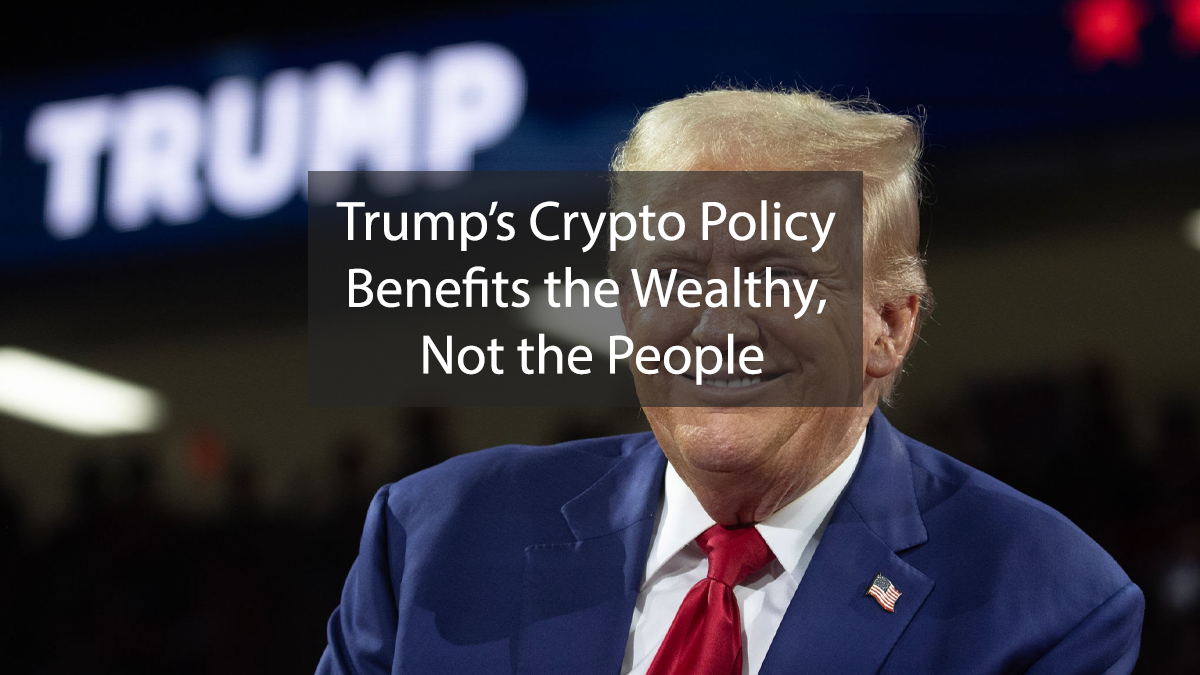
Trump’s Crypto Policy Benefits the Wealthy, Not the People
It’s no secret that Bitcoin and crypto are enjoying a new wave of political relevance. With Bitcoin trading near all-time highs and blockchain adoption going global, you’d think the moment has finally come for crypto to fulfill its original promise: a decentralized financial system that empowers ordinary people.
But instead, under the banner of “freedom,” Trump’s crypto agenda is carving out space for the rich and politically connected, not for the unbanked, the underrepresented, or the average user simply trying to escape broken systems.
Let’s break it down.
Crypto Was Born From a Crisis — Not For Billionaires
In case we’ve forgotten, Bitcoin wasn’t created for hedge funds. It emerged in response to the 2008 financial meltdown — a rejection of central banks, bailouts, and the rigged economic game. It was designed to bypass middlemen, not empower new ones.
Today, under President Trump’s second term, we’re watching crypto morph into something it was never meant to be: a weapon of influence, a playground for elites, and a political fundraising tool in blockchain form.
Take Trump’s World Liberty Financial (WLF), for example. A stablecoin project with deep ties to his family, WLF launched in lockstep with the administration’s push for deregulation. And right on cue, the Department of Justice disbanded its crypto enforcement team — the very group that previously targeted fraud, manipulation, and illicit finance in the sector.
Coincidence? Hardly.
Deregulation for Some, Scrutiny for None
While small crypto projects continue jumping through regulatory hoops and facing SEC heat, entities like WLF are operating in what looks suspiciously like a regulatory vacuum — created just for them.
Deregulation, in theory, is about opening doors. But in practice, Trump’s version of it seems tailored to benefit political insiders while weakening the guardrails meant to protect everyone else.
Even the optics are troubling:
- Trump-themed tokens and “politico-coins” are hitting exchanges.
- Pro-Trump NFTs are being sold as “access passes” to private fundraising dinners.
- Meanwhile, anti-fraud protections and regulatory clarity are fading into the background.
Crypto as a Political Tool: A Dangerous Precedent
The political branding of crypto has never been louder — or riskier. When tokens are built to curry favor with politicians rather than provide real utility or solve real problems, we’re no longer talking about decentralization. We’re talking about influence wrapped in blockchain.
Trump may claim to support crypto, but let’s be real: this isn’t about empowering the people. It’s about monetizing a movement and putting power in the hands of the same class that’s always held the keys.
And yes, the market may cheer short-term. Bitcoin rallies. Institutions pile in. Political pundits throw around words like “freedom” and “innovation.”
But behind the buzzwords lies a bitter truth: This agenda protects privilege, not potential.
What Crypto Should Be Fighting For
Let’s not forget what makes crypto powerful when done right:
- Sending money home without losing 20% to Western Union.
- Holding stablecoins in countries where inflation is 100%+.
- Accessing finance when your bank account is frozen or nonexistent.
- Escaping surveillance and authoritarian control through permissionless tools.
These are the use cases that built crypto’s foundation — not vanity coins, deregulation for donors, or tech washed in nationalism.
The unbanked and underserved deserve better than becoming background noise in someone else’s political power play.
This Is Not the Financial Revolution We Were Promised
Let’s be honest: Trump’s crypto narrative sounds great on a stage — freedom, innovation, sovereignty. But the execution is elitist, not egalitarian.
When deregulation becomes a smokescreen for insider profit, when investigations are dropped for politically tied firms, and when access is doled out based on loyalty rather than need — that’s not liberation.
That’s legacy finance… just rebranded.
What Needs to Change
If crypto is going to mean something in 2025 and beyond, the community — from builders to users — needs to:
- Reject political tokenization. Blockchain should not be a campaign tool.
- Push for transparency and fairness in both regulation and enforcement.
- Refocus on real-world use cases, especially those serving the global south, the financially excluded, and communities under oppressive regimes.
- Hold leaders — political or corporate — accountable when they co-opt crypto for personal gain.
The goal isn’t to stop crypto from entering the mainstream. It’s to ensure that when it does, it doesn’t lose its soul.
Final Thoughts: Crypto Can Still Win — But Not Like This
Financial freedom isn’t a campaign slogan. It’s a human right. And crypto’s potential to support that right is far too important to be hijacked by politics-as-usual.
The tools we build and the chains we run must serve people — not just portfolios.
Trump’s crypto play might win headlines, but if the industry wants legitimacy and impact, it’s time to reclaim the mission that made Bitcoin and blockchain revolutionary to begin with.










